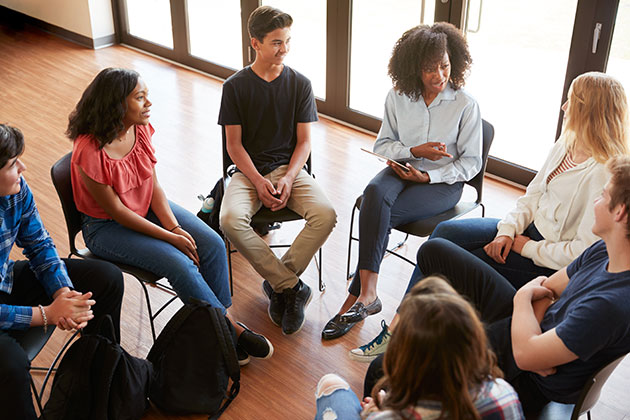Support and Skills Group
The support and skills group is a gathering of individuals who share common issues or experiences and meet regularly to discuss their challenges and progress in a supportive, therapeutic environment. Facilitated by Dr. Sarah Dihmes these groups provide emotional support, practical advice, coping strategies, and psychoeducation. Examples of topics include emotional regulation, distress tolerance, self-esteem, relationships, interpersonal effectiveness, and boundaries. They offer a safe space for members to express feelings, share experiences, and gain insights from others facing similar situations.
Interpersonal Process Group
An interpersonal process group is a safe and confidential place to explore and deal with relational issues such as intimacy, assertiveness, trust, boundaries, codependency, social anxiety, conflict, attachment-style. The group is an interpersonal learning laboratory where you learn to express your feelings, witness the impact of your behavior on others, and get feedback from group members. Group is also a place for to receive support from people who have similar struggles.
Here are some of the benefits of an interpersonal process group:
- Objective Insights: Feedback from group members is often more objective and unbiased than self-assessment. Others can offer observations and insights you might not have noticed on your own.
- Diverse Perspectives: Group settings bring together individuals from various backgrounds and experiences. This diversity allows you to receive feedback from a range of perspectives, enriching your understanding and broadening your horizons.
- Enhanced Self-Awareness: The reflections of group members can illuminate your blind spots and help you gain a deeper understanding of your behavior, emotions, and communication patterns.
- Real-Life Application: Interpersonal feedback provides practical insights you can immediately apply in real-life situations. As you practice these insights, you’ll notice positive changes in your interactions and relationships.
- Skill Development: Constructive feedback helps you refine your interpersonal skills, such as active listening, empathy, and conflict resolution. These skills are vital for building healthy connections with others.
- Empowerment: Receiving feedback empowers you to take charge of your personal growth. It encourages you to identify areas for improvement and actively work towards becoming a better communicator and collaborator.
- Encouragement and Motivation: Positive feedback boosts your confidence and motivation. Acknowledging your strengths and progress in a supportive group environment can inspire you to continue your personal development journey.
- Personalized Insights: Group members offer feedback tailored to your unique experiences and challenges. This customized feedback helps you address specific concerns and develop targeted strategies for improvement.
- Safe Environment: A well-facilitated group provides a safe space for open and honest discussions. This environment encourages vulnerability and fosters trust among participants, enabling more meaningful feedback exchanges.
- Skill Transfer: The feedback you receive in group settings can be transferred to various areas of your life. Whether it’s in personal relationships, professional collaborations, or social interactions, the skills you gain are versatile.
- Social Learning: Observing how others receive and process feedback can enhance your own feedback-receiving skills. Witnessing the growth of fellow group members can motivate you to embrace change and self-improvement.
- Mutual Support: Group members provide each other with a network of support. You’ll gain encouragement, feedback, and validation from others who are on their own healing journeys.
- Normalization of Experiences: Group therapy demonstrates that struggles are a normal part of the human experience. Hearing others share similar stories can reduce self-judgment and encourage self-compassion.
